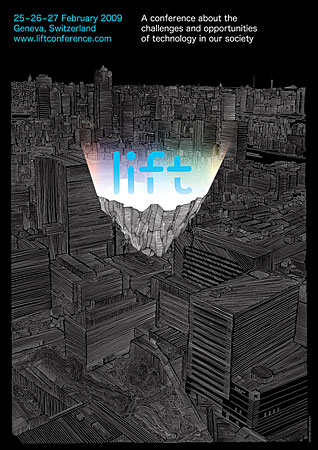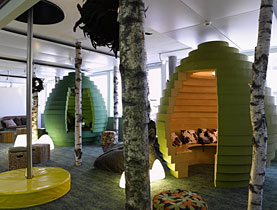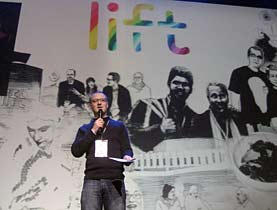Tech conference explores future innovations

"My vision is to hold Lift events around the world so that all year we can discuss the social impacts of new technologies," said the founder of Geneva's Lift conference.
swissinfo talked to Laurent Haug about what the future might hold at the start of the fourth new technology Lift conference, which brings together some 800 people from around the world.
This year’s event asks “Where has the future gone?” It looks at how people predict the future and why certain things promised by science fiction never materialised but other unexpected new technologies did.
Over three days, visitors can take part in a series of workshops, lectures, discussions and art events, and meet the people who are transforming technology.
Founded in 2006, Lift is starting to expand globally. The first Lift Asia event took place in South Korea in September 2008 and a second version is planned in September this year. Marseille is also holding a Mediterranean version of Lift on June 18-19, 2009.
swissinfo: These must be exciting times to be an internet entrepreneur.
Laurent Haug: Lots of things are happening. Technology is disappearing and being inserted into objects that communicate.
Two ideas I recently saw at Lift Asia really blew my mind. The first was a New-York based company called Megaphone. It’s hard to describe: outdoor, multiplayer mobile gaming. It blows people away where you start imagining any surface in a city becoming a source of interaction.
The second is by one of the guys who worked on the Sony Aibo robot. He has a new robot coming out next week that costs $300 [SFr348] and it does all the things that a machine costing 20 times that price was doing just a couple of years ago. In everyone’s minds robots are science fiction and not for tomorrow, but they are.
It’s a very interesting period. But I wouldn’t say about that about the web, which has become a less innovative market with Google, Facebook and the big players. It’s become much more complicated. But for the internet and communicative objects, it’s very exciting.
swissinfo: This year’s theme is about the future and certain unfulfilled dreams. Are you suggesting we lack a global overview of where we are going technologically?
L.H.: The problem is that everyone now is a stakeholder, so anyone can innovate. The web has shown us that a 22-year-old can invent Facebook and change the world.
Before, innovation was in the hands of an educated elite, but now it has spread and anyone can make a difference.
It’s harder to spot the innovations as they are spread around the globe This is why at Lift you are going to hear Africans, Koreans, Americans and Europeans. We try to go around the world to find the best ideas and bring them back to Switzerland.
swissinfo: What are your longer-term aims for Lift?
L.H.: We don’t really see Lift as a conference, but more as a community. What we want to do is create more opportunities for this community to get together. We are a really agile, web-based organisation, so we can easily go anywhere on the planet.
My vision would be to have Lift sessions held around the world managed by local people and some kind of emerging central coherence where all year long we discuss the social implications of technologies.
Geneva started as a blogging, web thing and now it’s become the most social of all the conferences. South Korea is becoming more about super-crazy, high-tech ideas and I think the Mediterranean will be more about the next steps of the internet.
My dream has always been Lift in Africa. We are currently talking about that. The first step was Asia, then Mediterranean and then we’ll see where the wind takes us. We’ve been contacted by Americans, Estonians, the city of Barcelona and lots of other cities are interested in hosting a Lift.
Lift happens via internet and anyone can approach us. We invite speakers from a country, their media talks about what happened and the next year we get 20 people from that country, and then 40 the next. It’s like planting seeds.
But they are quite expensive events to organise – Geneva cost SFr400,000 – so it’s a lot of work and you need a solid support network, especially public partners.
swissinfo: You’re French, but you have studied and worked here. Is Switzerland a good place to start out as an internet entrepreneur?
L.H.: I think it is, but for good and bad reasons. The good reason is that location doesn’t really matter anymore. What you need to be successful is a good idea, good infrastructure and good people, and we have all of that in Switzerland.
It’s also a good location for a bad reason which is that there are very few people creating new companies so when you start one it’s easy to stand out, gain access to entrepreneurship promotion agencies, get media attention and access the market.
It’s not a very competitive market; for start-ups the first three years are very hard but when you reach a certain maturity you are rewarded as there is much less competition and fewer obstacles.
swissinfo-interview: Simon Bradley in Geneva
Lift is an international conference that explores the challenges and opportunities of technology in society.
The fourth, Lift09, takes place in Geneva from February 25-27, 2009. The event has grown from 350 participants in 2006 to 800 in 2009.
This year’s conference is organised around a central theme: “Where did the future go?”
This year’s keynote speakers include: Vint Cerf, father of the internet and inventor of the TCP/IP Protocol, Patrick Gyger, director of the Maison d’Ailleurs Science Fiction Museum in Yverdon, Dan Hill from Arup, Kenyan blogger and digital activist Juliana Rotich and Yaoundé-based researcher Baba Wamé, who studies the impact of dating websites on Cameroonian society.
Lift comprises a mixture of developers, designers, entrepreneurs, investors, media professionals and curious individuals, with around 60 per cent coming from abroad.
Similar tech conferences include Web 3 held in Paris and Web 2.0 Berlin.

In compliance with the JTI standards
More: SWI swissinfo.ch certified by the Journalism Trust Initiative




You can find an overview of ongoing debates with our journalists here. Please join us!
If you want to start a conversation about a topic raised in this article or want to report factual errors, email us at english@swissinfo.ch.